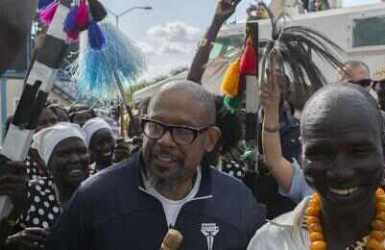US actor Forest Whitaker criticises use of child soldiers in S. Sudan
June 24, 2014 (JUBA) – A special envoy for the United Nations, Education, Scientific and Cultural Organisation (UNESCO) on Tuesday described as unacceptable reports that about 9,000 child soldiers were recently recruited and used in South Sudan’s ongoing conflict.

“Children are essential to building a peaceful future, but they cannot do so if they are subject to the physical and psychological abuse of being used in conflict”, he added.
The acclaimed actor urged the international community to speak out against this atrocity both in South Sudan and globally, and to pressure leaders to commit to protecting children and banning their use in conflict.
South Sudan government and its army (SPLA) formally renewed on Tuesday its commitment to the action plan signed in 2012 with the United Nations to end the recruitment and use of children in Government armed forces and other grave violations against children.
YOUTH PEACE PROGRAM
Whitaker also announced the expansion of the Youth Peacemaker Network (YPN) in the Equatoria regions.
This peace-building program was reportedly developed by the Whitaker Peace and Development Initiative (WPDI) in partnership with UNESCO, Ericsson and Zain Group.
“I have always believed that when given the right tools, youth have the power to create ripples of change through their communities that will ultimately lead to lasting peace”, Whitaker told reporters in the capital, Juba.
“This belief was reinforced during this trip to South Sudan, where the youth I met with are determined to build a better future,” he added.
The UNESCO envoy, however, expressed optimism for possible return of peace in South Sudan. He was accompanied by Irina Bokova, the director-general of UNESCO, Leila Zerrougui, the special representatives of the UN secretary-general for children and armed conflict, among others.
In 2012, WPDI initiated a peace-building and life-skills training program for young women and men from 11 counties and multiple ethnic tribes in the Jonglei state. As such, the program’s expansion to Equatoria is seen as a continuation of the initiative’s five-year commitment to the region.
The program, officials said, will initially focus on Eastern Equatoria, six months after South Sudan witnessed the worst outbreak of conflict in its post-independence era. It widely believed that the program will directly impact on hundreds of youth in the region and their local communities through a series of programs including peace-building, conflict resolution, life-skills, technology and vocational skills trainings.
“Education is the most powerful tool to give young people a voice and the skills to be active change-makers,” said Bokova, adding “I fully support this innovative initiative by UNESCO Special Envoy Forest Whitaker. I believe it is of crucial importance to South Sudan. It is also a message of hope for Africa’s youth”.
BETTER PROSPECTS
Meanwhile, Zain South Sudan’s chief executive officer, Basel Manasrah said the partnership with WPDI, UNESCO and Ericsson aims to enhance the prospects of young people in the country by bringing them together and motivating them to become agents of positive change.
“Through telecommunications, we are all jointly focused on narrowing the digital divide, capacity building and empowering the South Sudanese youth with the necessary skills to develop a more productive future”, he said.
Elaine Weidman-Grunewald, Ericsson’s vice-president of sustainability and corporate responsibility, said the telecom company advocates using technology as a force for good and remains committed to empowering the YPN through mobile technology.
“By enabling the youth from South Sudan to be connected to each other and to the world around them, we hope to further their peace-building efforts,” she said.
(ST)
